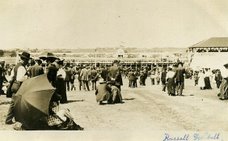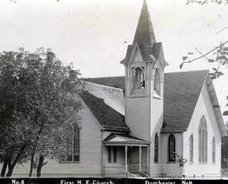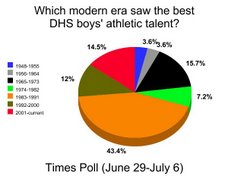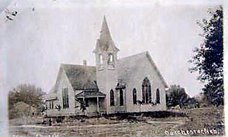 Down the road, on Highway 6, the fine folks of Fairmont are trying to save their small grocery store.
Down the road, on Highway 6, the fine folks of Fairmont are trying to save their small grocery store. It's a familiar story -- one that Dorchester lived in 2010. Earlier this year, Friend's longtime grocery store, Orv's, also closed.
The York News-Times earlier this week reported that "the Family Market on the main street of Fairmont is at risk to close … but not if a committee of local go-getters can find a way to keep it open."
According to the York newspaper, it's the same old story of minimum order requirements that makes maintaining a small-town grocery store so difficult.
Soon after learning of the current owner's plan to divest herself of her Fairmont store and her store in Kenesaw, Fairmont residents formed an SOS (Save Our Store) Committee to find a way to keep the Family Market open.
Derek Betka, Sheila Lauby, Rhonda Veleba and Village Clerk Linda Carroll of that committee sat on the bench in front of the business Monday to discuss the situation. Other members of the committee include Aaron and Jodi Fintel and also Pat Lentfer, Fillmore Co Economic Development director.
The story continues:
"The committee invited leaders from Henderson to explain how that community put together a group of investors to buy its grocery store and keep the lights on. Norm Yoder, retired Heartland superintendent of schools, was one of the key cogs of that successful project who brought what advice and information he could to Fairmont residents.
"Utica’s store was also purchased by locals there and relocated to a new building at the edge of downtown. Inventory for Utica is purchased through arrangement with a store in Seward."
The group in Fairmont is also working with Jim Crandall of the Cooperative Business Development Specialists and UNL.
Here's what Cradall -- a small-town grocery store expert -- told the York paper:
“There are several small towns in Nebraska who have seen their grocery stores close due to a number of reasons. Most of the time it is lack of family to carry on as aging owners near retirement. Some instances of medical issues with owners not able to continue or other circumstances. A few places where stores closed from lack of customers patronizing the store and yet often times those stores were not meeting the needs of the community in a variety of ways from hours open, selection, lack of fresh produce or meats, etc.
“My experience has been that we are seeing struggles with store closures in towns under 1200-1500. On the other end of the spectrum, low population towns struggle with enough buying capacity to support a store. He said 350-400 seems to be the minimum size unless they are in a very, very rural area.
“As towns lose their stores or see owners wanting to change ownership, communities first look for local solutions. Is there a family who will own the store, is there a larger grocery nearby that would put a branch store in our town? Corporate stores will not enter communities that small.
“Sometimes communities find themselves in a situation where they consider some kind of community or small group ownership. That could be in a cooperative of community members who have purchased shares in the business to capitalize the costs of buildings, inventory and staffing. I have cooperatively owned grocery stores with 160-plus members, another has about 110 owners. Each owner invested money in the coop by purchasing one or more shares,” he explained. “I have an LLC in one community with about 80 shareholders. Another LLC has 20 and each shareholder put in fairly large amounts of money. So there are a variety of approaches, but the general approach is to spread the risk over many people, share the talents of many people, elect a board of directors from the membership to oversee the business and then hope that everyone spends more of their grocery dollars at home.”
The York News-Times reports that Fairmont leaders are hopeful someone will by the store because the community, just off Highway 81, is starting to turn things around.
“Young couples are moving back to town. They are leaders and they are active,” one town leader said, adding her opinion that those new folks be brought onto the village board.
The age old adage that losing its grocery store or school is hard for small communities to overcome may be true, “But we still have our school,” another Fairmont leader said, referring to Fillmore Central Middle School. “It still brings 200 people into this town every day.”
The railroad plays a role in local commerce. It’s the same for the ethanol plant nearby and Betka spoke of a wind turbine project in Fairmont’s future, too.


















































This would have been so wonderful for Dorchester in 2010. I'm sure the town still misses having a grocery store.
ReplyDelete